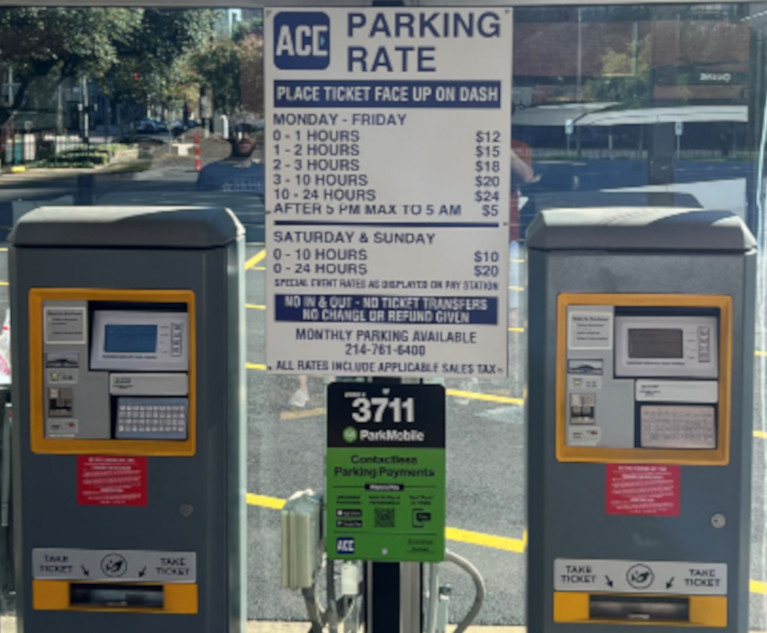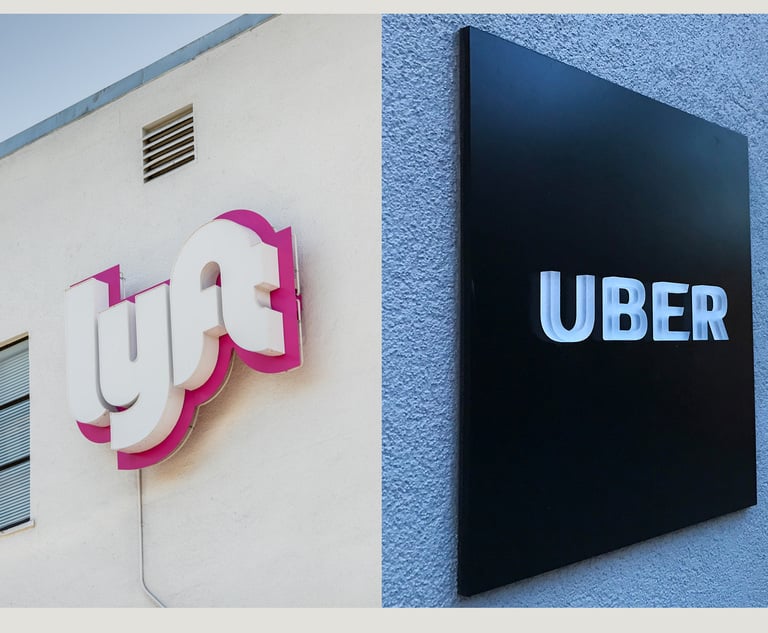 Quentin Brogdon is a personal injury trial lawyer in Dallas, Texas. (Courtesy Photo.)
Quentin Brogdon is a personal injury trial lawyer in Dallas, Texas. (Courtesy Photo.)Liability When the Uber or Lyft Driver is an Outlaw
Everyone was taught it is dangerous to hitchhike with strangers. Yet this is exactly what people do when they use Uber or Lyft to summon a ride.…
December 30, 2019 at 03:20 PM
7 minute read
Everyone was taught it is dangerous to hitchhike with strangers. Yet this is exactly what people do when they use Uber or Lyft to summon a ride. Uber and Lyft want their passengers' trust and money, but the companies want no legal accountability when one of their drivers rapes, robs or murders a passenger.
It is a pleasant fiction to believe that getting into an Uber or a Lyft vehicle is no different than getting into a taxicab. Unfortunately, the evidence indicates otherwise. Traditionally, cities heavily regulated taxicab companies operating in their cities. Those regulations inevitably included a requirement taxicab companies fingerprint their drivers to check criminal records. Why fingerprinting? Because fingerprinting is the gold standard for checking a person's criminal record. The use of names, dates of birth, Social Security numbers, and other alternative identifying information is far less reliable because it can too-readily be faked.
Uber and Lyft do not use fingerprinting to check their drivers' criminal records. In fact, both companies aggressively lobby state and federal legislators to abstain from requiring fingerprinting or any other driver-screening measure the companies are not already doing. The companies promote self-authored model legislation at the state level flatly prohibiting cities from requiring the fingerprinting of drivers. The speed and sweeping effectiveness of efforts by the upstart companies, Uber and Lyft to get state legislatures to overrule and preempt local regulation of the companies is completely unprecedented. By some accounts, over 40 states have passed protective legislation authored in whole or in part by Uber and Lyft in just the past few years. Effectively, the companies regulate themselves in most states, including in Texas.
After the city of Austin imposed a fingerprinting requirement on Uber and Lyft, Uber and Lyft spent $9 million in an unsuccessful attempt to get the city's requirement overturned. When that attempt failed, Uber and Lyft pulled out of Austin and employed an army of 40 lobbyists to lobby Texas legislators in 2017 to pass HB-100, a bill drafted by, and for Uber and Lyft.
HB-100 imposes background check requirements for drivers on Uber and Lyft, but the bill's minimal requirements do not exceed what Uber and Lyft already were doing, and the bill's requirements do not include fingerprinting. The bill adopts the ride-hailing companies' spin they're "transportation network companies" (TNCs), entities that did not previously exist under the law. HB-100 gives the exclusive authority to regulate and permit TNCs to the state of Texas, and removes the authority from cities. The bill prohibits cities from requiring TNCs to use fingerprinting or any other background check requirement not already within the bill. HB-100 also decrees TNCs are not common carriers. As common carriers of passengers for hire, taxicab operators owe passengers a "high degree of care," but TNCs effectively now must exercise only ordinary care. Finally, in a transparent attempt to distance Uber and Lyft from legal responsibility for the bad acts of their drivers, HB-100 defines TNC drivers as independent contractors, and not as employees.
Uber and Lyft consistently argue they merely broker relationships between willing passengers and drivers who are independent contractors. Because the companies claim to have no employer-employee relationship with their drivers, they can argue they shoulder none of the many responsibilities employers shoulder for employees. Those responsibilities include the responsibility to properly screen employees, the responsibility to properly train employees, and the responsibility to properly monitor employees. Although Uber and Lyft aggressively market safety to their users to increase the companies' bottom lines, when one of their drivers commits a crime against a passenger, the companies' legal position is the company bears no responsibility because the driver is not their employee.
A criminal's status as an independent contractor will not necessarily absolve the company from responsibility for the criminal's acts in Texas, however. In Read v. The Scott Fetzer Company d/b/a The Kirby Company, the Texas Supreme Court in 1998 was confronted with the question of whether the Kirby Company, a vacuum cleaner company selling its products through independent contractors and exercising control by requiring in-home demonstrations, owed a duty to act reasonably in the exercise of that control. In Read, a door-to-door vacuum salesman who was independent contractor raped a customer in her home.
Kirby argued it owed no duty to screen the rapist because it had successfully divorced itself from its independent distributors through contracts with the distributors mandating Kirby would exercise no control over the selection of independent contractors, such as the rapist. The Texas Supreme Court disagreed, noting Kirby's contract with its distributors "does not excuse Kirby from the duty to act reasonably with regard to the detail — required in-home sales — over which it did retain control." The Court observed that if a pre-employment check of the salesman had been performed, the check would have revealed women at the salesman's previous places of employment had complained of sexually inappropriate behavior and the salesman had been arrested for indecency with a child, and had been fired for the incident. The Court reasoned that "sending a sexual predator into a home poses a foreseeable risk of harm to those in the home," and the company could be liable for the salesman's rape of the customer, even though the salesman was an independent contractor.
Kirby retained a degree of control requiring its salesmen to be in close proximity to customers in their homes. Uber and Lyft likewise necessarily retain a similar degree of control by requiring their drivers to be in enclosed automobiles, in close proximity to the passengers who use Uber and Lyft. Just as Kirby could be liable for failing to adequately screen the independent contractor-salesman who raped a customer in her home, Uber and Lyft can be liable for failing to adequately screen one of their drivers who is a nominal independent contractor when that driver commits a crime against a passenger.
When a sexual assault or other crime is reported to Uber and Lyft, how do Uber and Lyft handle the report? The answer, at least with respect to Uber, does not inspire trust. According to an article in The Washington Post a few months ago, a number of Uber's employees came forward to reveal they are forbidden from contacting the police or advising victims to pursue legal advice when a crime is reported by a passenger. According to the article, Uber has a generous "three-strikes" policy allowing some drivers to remain driving until a fourth incident is reported. When Uber does decide to block a driver from its platform, Uber does not share that information with the police, background check firms, or other rideshare companies such as Lyft, allowing the driver to drive for other companies, according to the article.
Uber and Lyft certainly have the resources to protect their passengers from foreseeable harm at the hands of drivers. Uber and Lyft lack only the will. Our legislators have failed completely to summon the political courage to require Uber and Lyft to do what is necessary. All that remains to motivate Uber and Lyft is jurors doing what jurors do best – holding Uber and Lyft accountable at the courthouse.
Quentin Brogdon is a personal injury trial lawyer at Crain Brogdon Rogers in Dallas who has represented victims of rapes and other crimes at the hands of Uber and Lyft drivers. He is a Fellow in the invitation-only International Academy of Trial Lawyers and a Fellow in the invitation-only American College of Trial Lawyers. He can be reached at: [email protected].
This content has been archived. It is available through our partners, LexisNexis® and Bloomberg Law.
To view this content, please continue to their sites.
Not a Lexis Subscriber?
Subscribe Now
Not a Bloomberg Law Subscriber?
Subscribe Now
NOT FOR REPRINT
© 2025 ALM Global, LLC, All Rights Reserved. Request academic re-use from www.copyright.com. All other uses, submit a request to [email protected]. For more information visit Asset & Logo Licensing.
You Might Like
View All
Rogge Dunn Represents Florida Trucking Firm in Civil RICO Suit Against Worldwide Express
4 minute read

Uber Not Responsible for Turning Over Information on 'Dangerous Riders' to Competitor, Judge Finds
5 minute read
Class Action Claims American Airlines Implemented 'Unsustainable' Sales Plan Causing Stock to Tank
4 minute readTrending Stories
- 1Restoring Trust in the Courts Starts in New York
- 2'Pull Back the Curtain': Ex-NFL Players Seek Discovery in Lawsuit Over League's Disability Plan
- 3Tensions Run High at Final Hearing Before Manhattan Congestion Pricing Takes Effect
- 4Improper Removal to Fed. Court Leads to $100K Bill for Blue Cross Blue Shield
- 5Michael Halpern, Beloved Key West Attorney, Dies at 72
Who Got The Work
Michael G. Bongiorno, Andrew Scott Dulberg and Elizabeth E. Driscoll from Wilmer Cutler Pickering Hale and Dorr have stepped in to represent Symbotic Inc., an A.I.-enabled technology platform that focuses on increasing supply chain efficiency, and other defendants in a pending shareholder derivative lawsuit. The case, filed Oct. 2 in Massachusetts District Court by the Brown Law Firm on behalf of Stephen Austen, accuses certain officers and directors of misleading investors in regard to Symbotic's potential for margin growth by failing to disclose that the company was not equipped to timely deploy its systems or manage expenses through project delays. The case, assigned to U.S. District Judge Nathaniel M. Gorton, is 1:24-cv-12522, Austen v. Cohen et al.
Who Got The Work
Edmund Polubinski and Marie Killmond of Davis Polk & Wardwell have entered appearances for data platform software development company MongoDB and other defendants in a pending shareholder derivative lawsuit. The action, filed Oct. 7 in New York Southern District Court by the Brown Law Firm, accuses the company's directors and/or officers of falsely expressing confidence in the company’s restructuring of its sales incentive plan and downplaying the severity of decreases in its upfront commitments. The case is 1:24-cv-07594, Roy v. Ittycheria et al.
Who Got The Work
Amy O. Bruchs and Kurt F. Ellison of Michael Best & Friedrich have entered appearances for Epic Systems Corp. in a pending employment discrimination lawsuit. The suit was filed Sept. 7 in Wisconsin Western District Court by Levine Eisberner LLC and Siri & Glimstad on behalf of a project manager who claims that he was wrongfully terminated after applying for a religious exemption to the defendant's COVID-19 vaccine mandate. The case, assigned to U.S. Magistrate Judge Anita Marie Boor, is 3:24-cv-00630, Secker, Nathan v. Epic Systems Corporation.
Who Got The Work
David X. Sullivan, Thomas J. Finn and Gregory A. Hall from McCarter & English have entered appearances for Sunrun Installation Services in a pending civil rights lawsuit. The complaint was filed Sept. 4 in Connecticut District Court by attorney Robert M. Berke on behalf of former employee George Edward Steins, who was arrested and charged with employing an unregistered home improvement salesperson. The complaint alleges that had Sunrun informed the Connecticut Department of Consumer Protection that the plaintiff's employment had ended in 2017 and that he no longer held Sunrun's home improvement contractor license, he would not have been hit with charges, which were dismissed in May 2024. The case, assigned to U.S. District Judge Jeffrey A. Meyer, is 3:24-cv-01423, Steins v. Sunrun, Inc. et al.
Who Got The Work
Greenberg Traurig shareholder Joshua L. Raskin has entered an appearance for boohoo.com UK Ltd. in a pending patent infringement lawsuit. The suit, filed Sept. 3 in Texas Eastern District Court by Rozier Hardt McDonough on behalf of Alto Dynamics, asserts five patents related to an online shopping platform. The case, assigned to U.S. District Judge Rodney Gilstrap, is 2:24-cv-00719, Alto Dynamics, LLC v. boohoo.com UK Limited.
Featured Firms
Law Offices of Gary Martin Hays & Associates, P.C.
(470) 294-1674
Law Offices of Mark E. Salomone
(857) 444-6468
Smith & Hassler
(713) 739-1250






